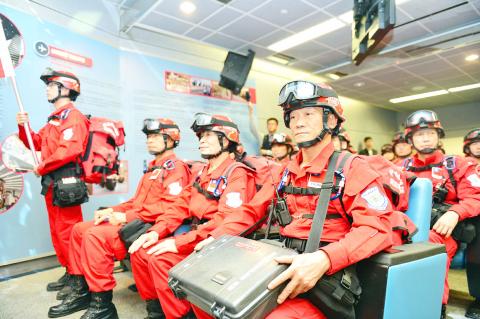Dozens of Taiwanese disaster relief and healthcare workers, representatives of charity groups and a medical team led by government officials yesterday left for Nepal, but Taiwan is still waiting for permits from Kathmandu to send search-and-rescue teams, authorities said.
A 37-member team from the Buddha’s Light International Association and physicians and nurses from Kaohsiung Chang Gung Memorial Hospital left in the morning, taking 5 tonnes of relief supplies, including blankets, tents, dried foods and medical supplies.
The team is scheduled to stay in Nepal for five days, International Headquarters Search and Rescue head Lu Cheng-tsung (呂正宗) said.

Photo: Yao Kai-shiou Taipei Times
Six medical personnel from the government-sponsored Taiwan International Health Action led by a Ministry of Health and Welfare official and accompanied by two Ministry of Foreign Affairs officials familiar with the situation in Nepal left in the afternoon.
Representative to India James Tien (田中光), who has been in Kathmandu since the earthquake on Saturday, would assist the relief workers if needed, foreign ministry spokesperson Anna Kao (高安) said.
Kathmandu has not yet accepted Taiwan’s offer to send official search-and-rescue teams.
Deputy Minister of Foreign Affairs Andrew Kao (高振群) on Monday said that Kathmandu has asked for search-and-rescue help only from neighbors such as China, India and Pakistan, and cited the great distance and the lack of direct flights and diplomatic relations for the handling of Taiwan’s offer.
Early yesterday at a regular news conference, Ministry of National Defense spokesperson David Lo (羅紹和) said the ministry has had everything ready to dispatch C-130 aircraft from Pingtung County to Nepal.
However, anonymous sources at the defense ministry said it would be more efficient to deliver aid via commercial flights than military aircraft because it would take the C-130s 11 to 14 hours to reach Nepal as they would have to fly over open ocean instead of crossing China’s airspace, the sources said.
The lack of diplomatic relations with most nations in the region would also create problems if they were to allow the aircraft through their airspace or grant them necessary refueling stops en route to Nepal, the sources added.

MAKING WAVES: China’s maritime militia could become a nontraditional threat in war, clogging up shipping lanes to prevent US or Japanese intervention, a report said About 1,900 Chinese ships flying flags of convenience and fishing vessels that participated in China’s military exercises around Taiwan last month and in January last year have been listed for monitoring, Coast Guard Administration (CGA) Deputy Director-General Hsieh Ching-chin (謝慶欽) said yesterday. Following amendments to the Commercial Port Act (商港法) and the Law of Ships (船舶法) last month, the CGA can designate possible berthing areas or deny ports of call for vessels suspected of loitering around areas where undersea cables can be accessed, Oceans Affairs Council Minister Kuan Bi-ling (管碧玲) said. The list of suspected ships, originally 300, had risen to about

DAREDEVIL: Honnold said it had always been a dream of his to climb Taipei 101, while a Netflix producer said the skyscraper was ‘a real icon of this country’ US climber Alex Honnold yesterday took on Taiwan’s tallest building, becoming the first person to scale Taipei 101 without a rope, harness or safety net. Hundreds of spectators gathered at the base of the 101-story skyscraper to watch Honnold, 40, embark on his daredevil feat, which was also broadcast live on Netflix. Dressed in a red T-shirt and yellow custom-made climbing shoes, Honnold swiftly moved up the southeast face of the glass and steel building. At one point, he stepped onto a platform midway up to wave down at fans and onlookers who were taking photos. People watching from inside

Japan’s strategic alliance with the US would collapse if Tokyo were to turn away from a conflict in Taiwan, Japanese Prime Minister Sanae Takaichi said yesterday, but distanced herself from previous comments that suggested a possible military response in such an event. Takaichi expressed her latest views on a nationally broadcast TV program late on Monday, where an opposition party leader criticized her for igniting tensions with China with the earlier remarks. Ties between Japan and China have sunk to the worst level in years after Takaichi said in November that a hypothetical Chinese attack on Taiwan could bring about a Japanese

STREAMLINED: The dedicated funding would allow the US to transfer equipment to Taiwan when needed and order upgraded replacements for stockpiles, a source said The US House of Representatives on Thursday passed a defense appropriations bill totaling US$838.7 billion, of which US$1 billion is to be allocated to reinforcing security cooperation with Taiwan and US$150 million to replace defense articles provided to the nation. These are part of the Consolidated Appropriation Act, which the US House yesterday passed with 341 votes in favor and 88 against. The act must be passed by the US Senate before Friday next week to avoid another government shutdown. The US House Committee on Appropriations on Monday unveiled the act, saying that it allocates US$1 billion for the Taiwan Security Cooperation Initiative